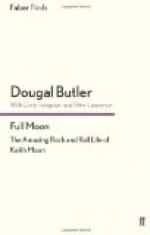His lips moved now, and he spoke aloud. His voice sounded sharply in the heavy silence.
“A calamity—nothing less. How did it happen? Was it grief for his wife?”
His face showed unusual agitation—distress even. It was well his clients could not see him at that moment. To them he was a remote enigmatic figure of conveyances and legal deeds; one deeply versed in human follies and foibles, but impervious to human feeling, independent of human companionship. The reserved glance of his cold grey eye betokened that he guarded his own secrets as closely as he guarded the secrets entrusted to him professionally. But there was human nature in him—deep down. It was not much—a lock of hair in a sealed packet in his pocket-book. The giver was dead and gone to dust, sleeping in an old churchyard near the Strand, forgotten by all who had ever known her—except one. Sometimes in the twilight a tall figure would stand musing beside that forgotten grave for awhile, then turn away and walk swiftly up the narrow river street, across the Strand, and through the archway to Grey’s Inn.
“Thirty years!” he murmured. Then his mind seemed to hark back to his previous thought, after the fashion of a man who thinks aloud—“No, no; not his wife. He did not care enough for her for that. Thirty years—wasted. My heart bleeds when I think of it. Ought I to go down? Did he wish for me? I wonder—”
His distress as he paced the room was more apparent than ever. Again, his clients would have been astonished if they had witnessed it. In their opinion he was hard as nails and a stranger to the softer feelings of the heart. They would as soon thought of attributing sentiment to one of the japanned deed-boxes. But they would have accepted the surprising revelation with well-bred English tolerance for eccentricity, not allowing it to affect their judgment that Mr. Brimsdown was one of the soundest and safest lawyers in England.
His agitation arose from the death of Robert Turold—his client. He had gathered that piece of news from an evening newspaper in the restaurant where he had dined. Mr. Brimsdown had reached an age when the most poignant events of human life seem little more than trifles. It was in the nature of things for men to die. As a lawyer he had prepared many last wills and testaments—had helped men into their graves, as it were—unmoved. But that unexpected announcement of Robert Turold’s death had come to him as an over-whelming shock. He had left his meal unfinished, and returned to his chambers to seek consolation, not in prayer, but in his collection of old clocks and watches. In the dusk he had set out his greatest treasures—the gold sun-dial, a lamp clock, an early French watch in blue enamel, and a bed repeating clock in a velvet case. But the solace had failed him for once. Even the magic name of Dan Quare on the jewelled face of the repeater failed to stir his collector’s heart.




